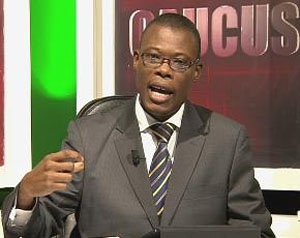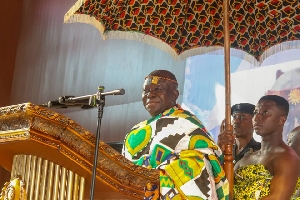- Home - News
- TWI News | TV
- Polls
- Year In Review
- News Archive
- Crime & Punishment
- Politics
- Regional
- Editorial
- Health
- Ghanaians Abroad
- Tabloid
- Africa
- Religion
- Election 2020
- Coronavirus
- News Videos | TV
- Photo Archives
- News Headlines
- Press Release
General News of Wednesday, 24 October 2012
Source: GNA
Education is not our number one priority - Fifi Kwetey
Mr Fifi Kwetey, a Deputy Minister of Finance and Economic Planning has reiterated the National Democratic Congress’ (NDC) commitment to ensure quality education that would be accessible to all.
He said access to quality education was the most critical need facing education in Ghana and not free education at Senior High School level as the opposition New Patriotic Party (NPP) wanted the electorate to believe.
“The National Democratic Congress has explained that in the light of resource constraints that face Ghana, just like other developing countries, our foremost attention must be on channeling resources to improve the quality of education and access to education,” he said.
Mr Kwetey was speaking at the NDC Forum for Setting the Records Straight series organised in Accra to highlight the achievements in the educational sector by the party and other strategies to achieve accessible quality education.
He said the promise made by Nana Addo Dankwa Akufo-Addo, NPP Presidential Candidate to give free education at Senior High School level, when voted to power cannot be feasible because although the cost of education is important it is not the number one priority.
“NPP’s belief that the biggest problem facing the educational sector in Ghana today is the cost of second cycle education shows the complete lack of understanding by the NPP. Any elementary analysis of the educational situation in Ghana will reveal that the most critical factor facing the sector is access to quality education.”
Mr Kwetey said the NDC firmly believed that the best approach to advancing the educational fortunes of Ghana is to focus on expanding the educational infrastructure to increase access and invest in improving the quality of education and to pay maximum attention to basic level education.
He said education at the basic level is the root of the educational tree and by machining it completely free, compulsory and universal and subject to resource availability progressively make higher level education affordable.
He said “the NDC, unlike the NPP, is conscious of the fact that 18.3 per cent of children who should be in primary school are not in school; 53.9 per cent of children who should be in Junior High School are not in school”.
“The NDC is also aware that the existing 8,557 Junior High School cannot absorb the primary six pupils from 14,360 primary schools. The NDC is also aware that the same inadequate infrastructure problem afflicts the secondary and tertiary levels of education,” he said.











